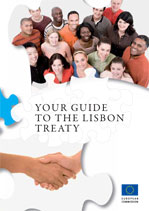This photo is at the top of the website: Human beings as pieces of a puzzle all to be fitted together into a single unity. The EU openly advertises its totalitarian agenda.
INTRODUCTION
After decades of war that cost millions of lives, the foundation of the EU marked the beginning of a new era where European countries solve their problems by talking, not fighting.
Today, members of the EU enjoy a wealth of benefits; a free market with a currency that makes trade easier and more efficient, the creation of millions of jobs, improved workers’ rights, free movement of people and a cleaner environment.
The existing rules, however, were designed for a much smaller EU, and an EU that did not have to face global challenges such as climate change, a global recession, or international cross-border crime. The EU has the potential, and the commitment, to tackle these problems, but can only do so by improving the way it works.
This is the purpose of the Lisbon Treaty. It makes the EU more democratic, efficient and transparent. It gives citizens and parliaments a bigger input into what goes on at a European level, and gives Europe a clearer, stronger voice in the world, all the while protecting national interests.
The Treaty provides for a new Citizens’ Initiative, whereby you can, with one million signatures, petition the European Commission to advance new policy proposals.
National parliaments in each Member State will be given a greater role in examining EU laws before they are passed to ensure that the EU does not overstep its mark on matters that should be dealt with at a national or local level.
The powers of the European Parliament will be increased, giving the MEPs you directly elect more of a say on a wider range of issues.
Contrary to the existing (Nice) Treaty, the Commission will continue to be formed of one Commissioner from every Member State.
This leaflet explains what the Lisbon Treaty means to you as a citizen.
A UNION FOR THE 21ST CENTURY
The Lisbon Treaty was signed by the 27 European Union Member States on 13 December 2007.
For the Treaty to enter into force, all of the EU countries must approve it in accordance with their national procedures.
Why the need for a new treaty?
The EU has changed. The number of Member States has quadrupled. In the past 5 years alone, the number has almost doubled.
The world is changing fast too. Europe faces huge challenges in the 21st century including the economic crisis, climate change, sustainable development, energy security and fighting international cross-border crime.
The Member States who drew up the Lisbon Treaty together recognised that the existing treaties did not equip the European Union with the tools it needs to face these challenges and deal with these changes.
- The Lisbon Treaty amends and updates earlier EU treaties
- It takes account of the fact that the EU has grown from the six founding Member States to its present 27 and the many developments in the last 50 years.
- The Treaty, if approved in all 27 EU countries, will improve working methods to ensure that the Union does its business as efficiently and effectively as possible in the 21st century.
- The Treaty helps the EU to serve your interests better, and gives you a direct say in European matters through the new Citizens’ Initiative.
- It protects your rights with the Charter of Fundamental Rights.
- It strengthens the role of the European Parliament and gives new powers to national parliaments.
- It makes decision-making at the European level more efficient.
- It helps the EU to speak with a single voice in the world.
- It introduces new measures to tackle pressing issues that affect our quality of life, like climate change, cross border crime and energy.
- At the same time, it protects the rights of each Member State, especially in sensitive areas such as taxation and defence.
The EU’s aims and values
The Lisbon Treaty clearly sets out the European Union’s aims and values of peace, democracy, respect for human rights, justice, equality, rule of law and sustainability.
The Treaty pledges that the European Union will:
- Offer people an area of freedom, security and justice without internal frontiers
- Work for the sustainable development of Europe based on balanced economic growth and price stability, a highly competitive social market economy, aiming at full employment and social progress, with a high level of protection of the environment;
- Combat social exclusion and discrimination and promote social justice and protection;
- Promote economic, social and territorial cohesion, and solidarity among Member States;
- Remain committed to economic and monetary union with the Euro as its currency;
- Uphold and promote the European Union’s values in the wider world and contribute to peace, security, the sustainable development of the earth, solidarity and respect among peoples, free and fair trade, and the eradication of poverty;
- Contribute to the protection of human rights, in particular the rights of the child, as well as the strict observance and development of international law, including respect for the principles of the United Nations Charter.
These are major goals. The Lisbon Treaty is designed to give the EU the tools to achieve them.
Key provisions of the Lisbon Treaty
More democracy, more openness
The Treaty gives you a stronger voice in decision making.
A new Citizens Initiative means that one million people—out of the EU’s population of 500 million—from a number of Member States can petition the European Commission to bring forward new policy proposals.
This gives you a direct say in the EU’s lawmaking for the first time.
To improve information about how the EU reaches decisions, the Council of Ministers will now have to meet in public when it is considering and voting on draft laws.
The Treaty increases the number of areas where the European Parliament shares decision making with the Council of Ministers. That means that the MEPs you elect directly will have much more say in lawmaking and the EU Budget.
At home, the national parliaments will have greater opportunities to make a direct input into EU decision-making.
A new early warning system gives national parliaments the right to comment on draft laws and to check that the EU does not overstep its authority by involving itself in matters best dealt with nationally or locally.
Faster, more efficient decision-making
The Lisbon Treaty streamlines the EU’s decision-making procedures.
In the Council of Ministers, qualified majority voting, instead of unanimous decisions, will be extended. This will help to make action faster and more efficient.
Qualified majority voting means that, from 2014, decisions of the Council of Ministers will need the support of 55% of the Member States, representing at least 65% of the European population. This system gives double legitimacy to decisions.
Strict rules will apply to any proposals to move new policy areas to majority voting. Every Member State must agree to any such change and the national parliaments will have a right of veto.
But important policy areas such as taxation and defence will continue to require a unanimous vote.

